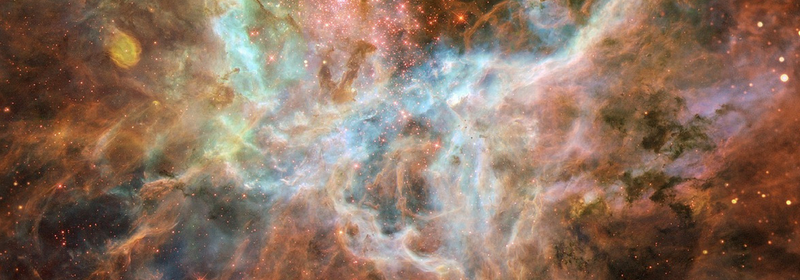
Extraterrestrial Life – Evolution Demands It
We’ve received scores of great feedback about this year’s theme, “Space Exploration.” Over the last several weeks, there have been several major stories about this topic; the first private rocket to dock with the International Space Station, and NASA’s discovery of several Earth-like planets among them.
Article Header
« Return to Main PageExtraterrestrial Life – Evolution Demands It
We’ve received scores of great feedback about this year’s theme, “Space Exploration.” Over the last several weeks, there have been several major stories about this topic; the first private rocket to dock with the International Space Station, and NASA’s discovery of several Earth-like planets among them.
Scripture proclaims that “the heavens declare the glory of God.” For the believer, when it comes to the thought of how vast the universe is, and how we haven’t even tapped the surface of its size, it can’t help but give us cause to worship our Creator.
We hear much in the media about the idea of extraterrestrial life. For many, the idea of the purpose of exploring other worlds (and the universe in general) is driven by thoughts of “Is there life out there?” and, “Could mankind survive on another planet someday?”

The idea of there being intelligent life on other planets does bring many theological questions to the forefront: Is the idea biblical? Are aliens fallen creatures? And a host of others.
While those questions are intriguing (and valid), when it comes to the evolutionary worldview, it’s absolutely consistent (and necessary) that there be life on other planets. Mathematics demands it–the universe is simply too large.
According to a paper on the University of Rochester website which talks about the Drake equation, “unless the odds of advanced life evolving on a habitable planet are astonishingly low, then human kind is not the universe’s first technological, or advanced, civilization.” Mathematically, “civilization is likely to be unique in the cosmos only if the odds of a civilization developing on a habitable planet are less than about one in 10 billion trillion, or one part in 10 to the 22th power.
Probability essentially states that it’s unlikely that we should even exist! (How do you like that for a definitive statement!) According to the evolutionary worldview, the fact that we do exist (along with the shear size and age of the universe), life must be out there–somewhere.
Back to NASA’s Recent Discovery
Three of the 7 “earth-sized” planets that orbit the star TRAPPIST-1 are located in a region known as the “habitable zone.” Since liquid water is essential for life, some claim that life could possibly exist on one of these extraterrestrial worlds.
According to Dr. Danny Faulkner, an astrophysicist with Answers in Genesis, it’s “premature to conclude that any of these planets, despite being in the habitable zone, are conducive for life.” Faulkner states that there have been other discoveries of planets that seem “earth-like,” that that there’s no guarantee that a planet’s size or proximity to a star provides an atmosphere adequate for life.
Dr. Faulkner also makes the case that many of these planets could, in fact, prove that the age of the universe is compatible with the Bible. “According to the evolutionary timeframe, it took three billion years for higher life to develop on earth, so (NASA’s) results are a serious problem for the possibility of life on the planets orbiting TRAPPIST-1.”
Conclusion
Could there be intelligent life out there? It’s a good, and fun to discuss. The issue, though, isn’t the ultimate question. Who created the heavens and all that’s in them and what is my responsibility to Him? That’s the most important question.
This year's Ci 4.0 theme is "Space Exploration." Certainly, this topic will be a big part of the discussion! If you have a STEM-minded young person who’s ready to be challenged and edified this summer, check out our upcoming camps at http://campinfinity.com/camps.









